How a rough Apartheid-era school spawned an award-winning YA novel
- Share via
Malla Nunn’s “When the Ground is Hard,” the 2019 winner of the Los Angeles Times Book Prize for young-adult literature, will summon a familiar world for fans of her award-winning Detective Emmanuel Cooper series. Both narratives are set in the earlier years of South African apartheid, a time and place far removed from author’s longtime home in Sydney, Australia.
Nunn was born in Swaziland, and her novel “When the Ground Is Hard” pays homage to her mother and aunt’s 1960s schooldays at a missionary-run “Christian Academy,” the same one Nunn herself eventually attended before emigrating Down Under, at 14, with her family. Unlike many young-adult novels reaching into the writer’s childhood, it was hardly a work of nostalgia.
“This book came out of a massive failure of trying to write something that I thought would just be entertaining,” says Nunn, speaking by phone from Sydney, “instead of just writing what was close to my heart. I’ve been to this boarding school, why would I want to go back there? But a writer friend encouraged me, and also said: Take really good care of yourself while you work on this. You’re going to be going back to a place you didn’t love.”
No one loves the Keziah Christian Academy of Nunn’s novel, especially not protagonist Adèle Joubert, whose mother feels proud that her children’s bigamist white South African father pays their school fees. Accustomed to being in the clique of “pretty” girls in the institution for multiracial children, Adele returns for the new year to find herself sent down a rung — forced to room with Lottie, whose poverty and odd behavior make her a pariah.

“Even after I conceived of the relationship between these two girls, I was still pretty resistant to actually writing about them,” says Nunn. “This is my blood in this book. It’s my mother, my aunties, my grandmother. We all went to that school. My parents worked at that school. Our experience was not entertaining. I needed to write about what was actually important in our experience.”
She needed to make it understood across cultures as well. “It’s not something Americans can understand, even Americans of color,” she says. “The caste system, for people like me who were multiracial, was microclassified. I learned that we were completely between things, as if my entire world was saying, ‘There is no solid ground for you. You must find your own way.’”
The 14 Times book prize winners, including Steph Cha, Namwali Serpell, Marlon James and George Packer, were honored in a virtual ceremony on Twitter.
You could do that, Nunn says, only by “importing whatever powers you can back from those who are on solid ground. If you were lighter skinned, it was really important that you had money, for example. There were a huge amount of rules to remember and follow.”
Take, for instance, Adèle’s habit of hoarding shop-bought cookies and canned fruit: “First, those packaged sweets are manufactured, which means more Western, more ‘wealthy.’ Also, since you could keep them for months without spoilage, they promised celebration at any time, without it being a holiday or an outing. Third, a bit of sweetness is such a human need.”
Despite her own later experiences at the school, Nunn needed a gut-check from her elders to know she’d fully captured the texture of the ‘60s. “When I finished this book I sent it to my aunt, on whom Lottie is based,” Nunn says. “She responded by text and said, ‘I’m crying now. I’d like to tell you I’m crying for Lottie. But I’m really crying.’ I knew then I’d gotten something right.”
It was personal, Nunn explains. Her aunt “was very tall, slender, poor and bright.” It was tough enough to be female and mixed, “but to be poor and bright as well? There were three roles you could fulfill. You could be a teacher, a nurse or the boyfriend of a rich white guy. That was absolutely part of the cultural understanding.”
Though focused on Adèle and Lottie, the novel takes in the broader scope of apartheid, which left no one unscathed — including the oppressors. An important subplot in the book involves an Afrikaans farmer whose land abuts Keziah Christian Academy. Mr. Bosman is as poor as many of the academy students, but he wields his white privilege as a weapon against all incursions. “Poor white people were just often hanging on to that privilege because it was all they had,” says Nunn. “They had terrible lives and took it out on black people. There were just layers of suffering everywhere, with everybody.”
Nunn feels sympathy even for those who made their fortunes off apartheid. “When I see very rich white South Africans who come to Australia: ‘Well, you’ve escaped.’ But somehow, I hope at some point, you take stock of who you are and how your money was made. I hope you have some grace about it. But I doubt it.”
Nunn is grateful that her family too escaped, including her aunt, the real-life Lottie, who went to a reunion at the Christian school a couple of years ago. “I said to my aunt, was it really hard?” Nunn remembers. “And she said ‘Malla, I loved it. You know why? Because I live in Australia. I have a daughter who works at Apple and a grandson in law school. I walked in there and I used to be one of the poorest kids, with holes in my shoes. And I felt like God may not come when you want him, but he’s always right on time.’”
Bethanne Patrick is a freelance critic who tweets @TheBookMaven.
Los Angeles Times Book Prize winners

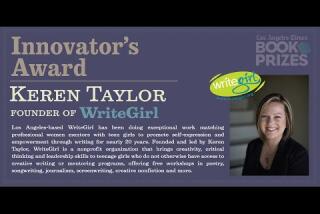
Los Angeles Times Book Prizes: Keren Taylor, Innovator's Award
2:04
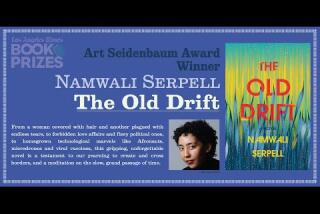
Los Angeles Times Book Prizes: Namwali Serpell, Art Seidenbaum Award
1:51

Los Angeles Times Book Prizes: Maria Popova, Science & Technology
3:09
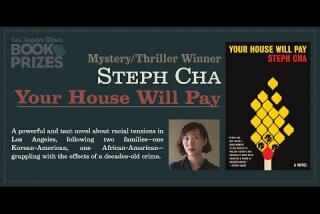
Los Angeles Times Book Prizes: Steph Cha, Mystery/Thriller
1:33
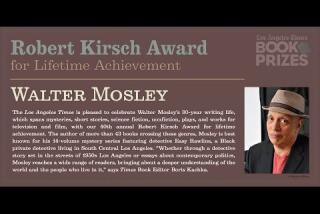
Los Angeles Times Book Prizes: Walter Mosley, Robert Kirsch Award for Lifetime Achievement
2:27
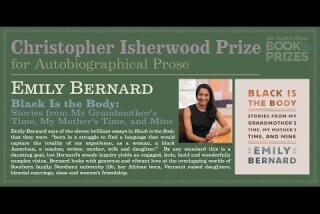
Los Angeles Times Book Prizes: Emily Bernard, Christopher Isherwood Prize for Autobiographical Prose
1:43
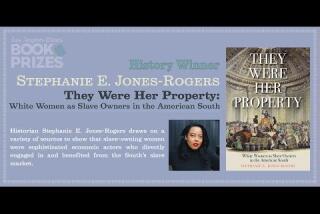
Los Angeles Times Book Prizes: Stephanie E. Jones-Rogers, History
1:35
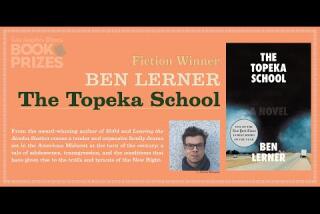
Los Angeles Times Book Prizes: Ben Lerner, Fiction
1:11
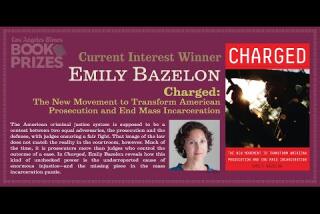
Los Angeles Times Book Prizes: Emily Bazelon, Current Interest
0:42
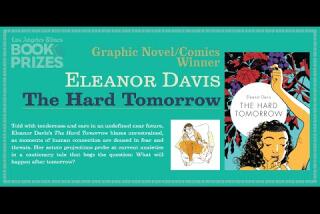
Los Angeles Times Book Prizes: Eleanor Davis, Graphic Novel/Comics
2:00
More to Read
Sign up for our Book Club newsletter
Get the latest news, events and more from the Los Angeles Times Book Club, and help us get L.A. reading and talking.
You may occasionally receive promotional content from the Los Angeles Times.







